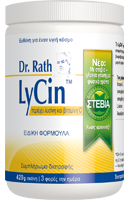The added benefit of an extra supply of the essential amino acid lysine and vitamin C
Connective tissue is a general term for the body’s connecting and supporting system. Connective tissue encloses the nerves, blood vessels and organs, and connects all the components to each other, e.g. as an enveloping tissue (the fibrous capsules around the organs), as the parenchyma (the organ-free spaces), and as a structural tissue (the organs).
“Soft” connective tissue includes cartilage, ligaments, tendons, blood vessels, fibrous capsules and joint capsules. In the form of ligaments, it serves, for example, to stabilize the joint; as tendons it serves to transmit force.
“Hard” connective tissue (bones) contains additional mineral deposits. Because of its great strength, collagen has an important function in supporting the structure of bones and teeth.
At the same time, connective tissue also functions in protecting the body. So on the whole, the construction and maintenance of collagen fibres and connective tissue are important metabolic processes for general health. One of the major collagen molecules is the amino acid lysine. This amino acid is essential (i.e. vital, but not made by the body itself) and therefore must be supplied from food or dietary supplements.
Vitamin C makes an important contribution to the production and optimum structure of collagen fibres. Similarly to lysine, vitamin C is not produced in the human body and it must be supplied in our diet. The formation of collagen fibres and connective structures forms the basis for the good functioning of all our body organs (for example, blood vessels, cartilage, bones etc.) and the entire body.
How to take it:
Stir a measuring spoonful (about 10 g) of LyCin™ into a drink. LyCin™ is tasteless and mixes well with fruit juice, tea or other drinks. Please stir well before drinking. Increased bowel movements may ensue if large amounts of vitamin C are consumed, a sign that your body has reached the upper limit for this nutrient. Further information about the tolerance limit for vitamin C.



